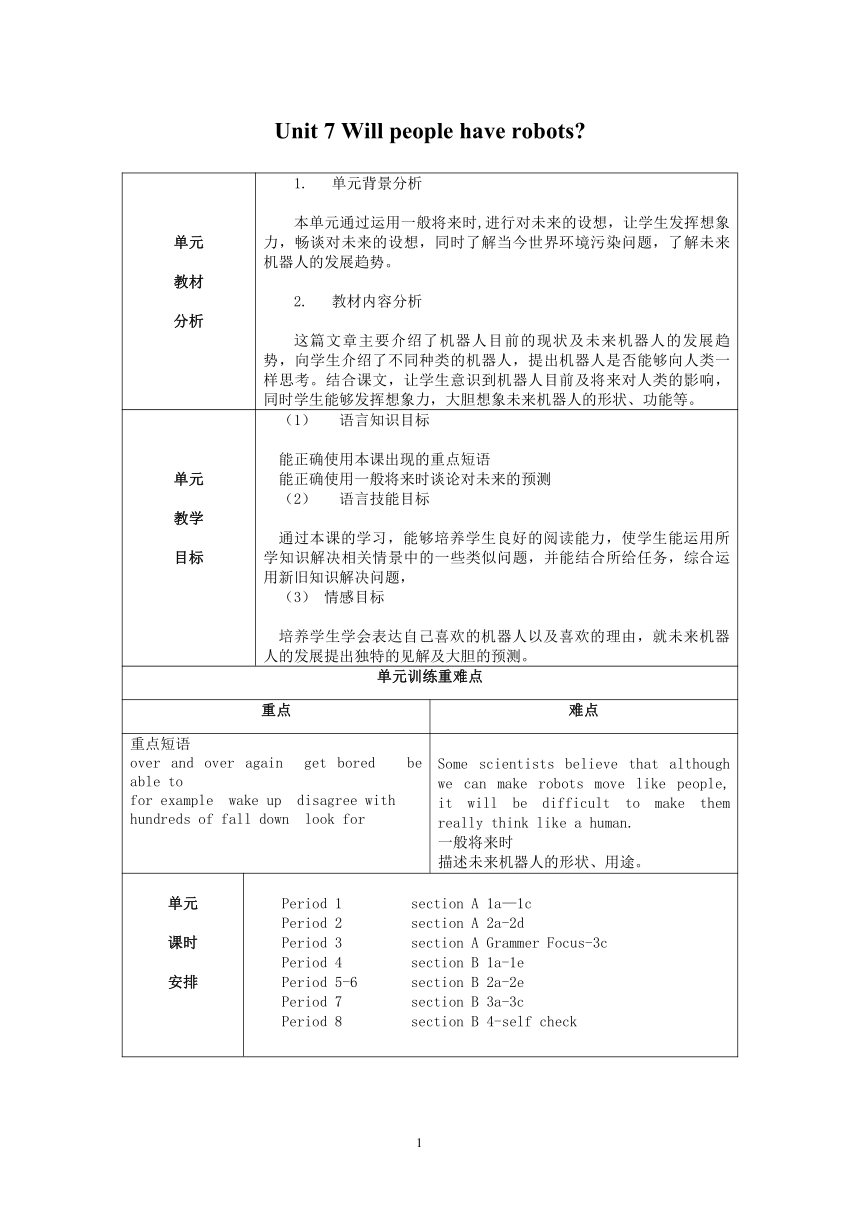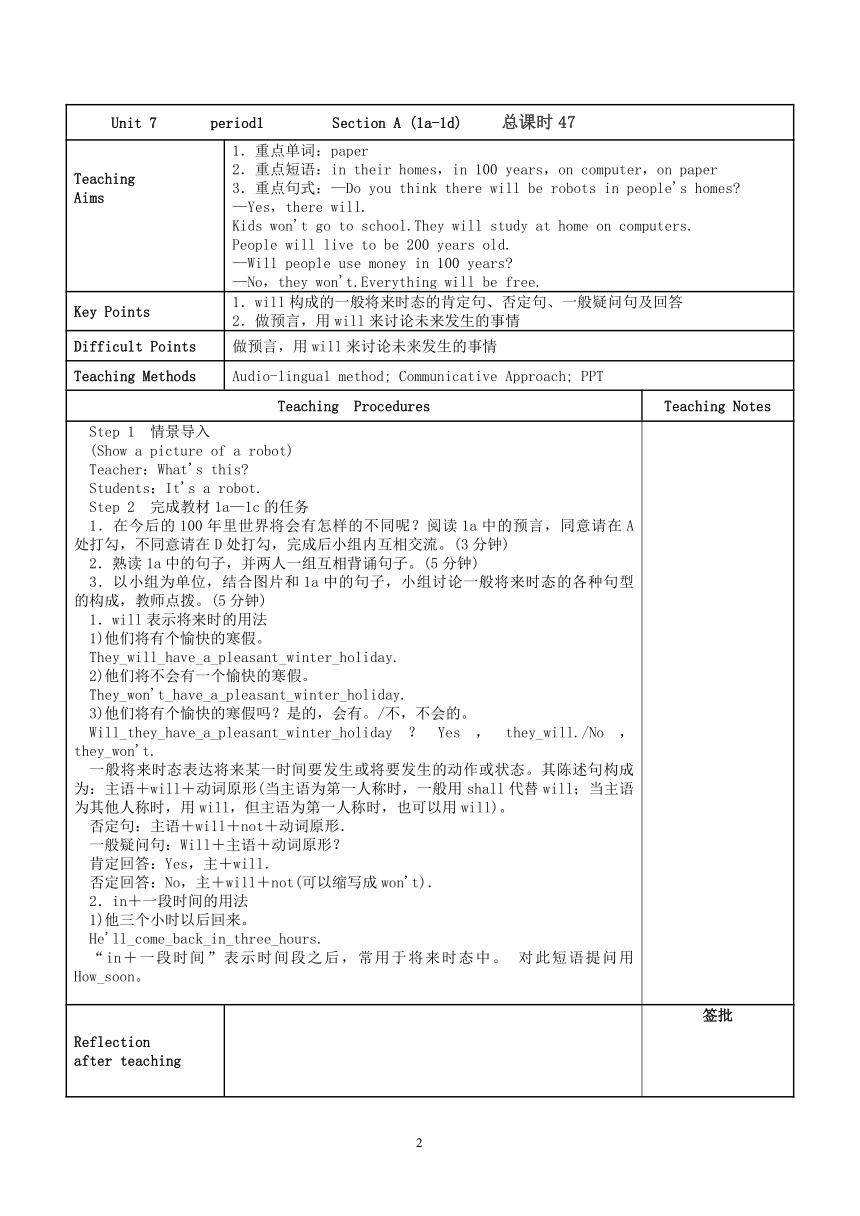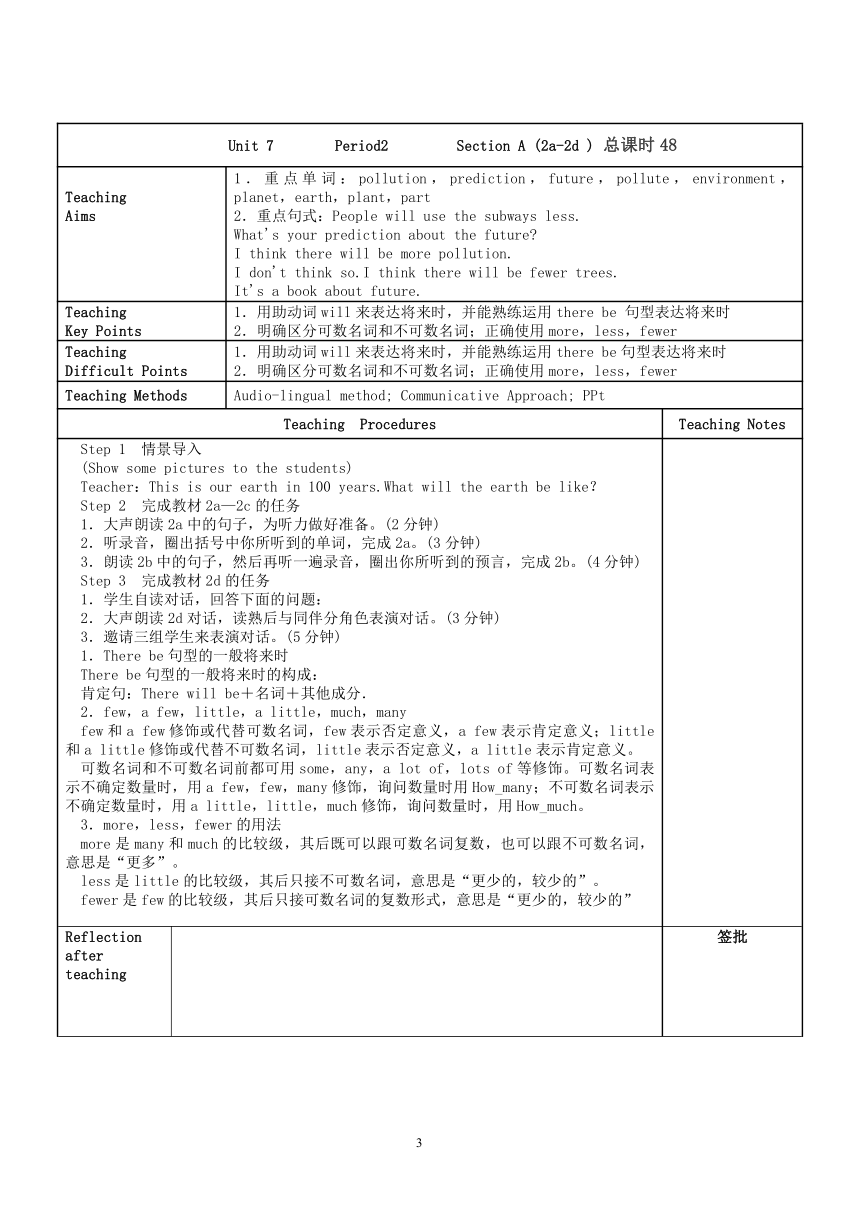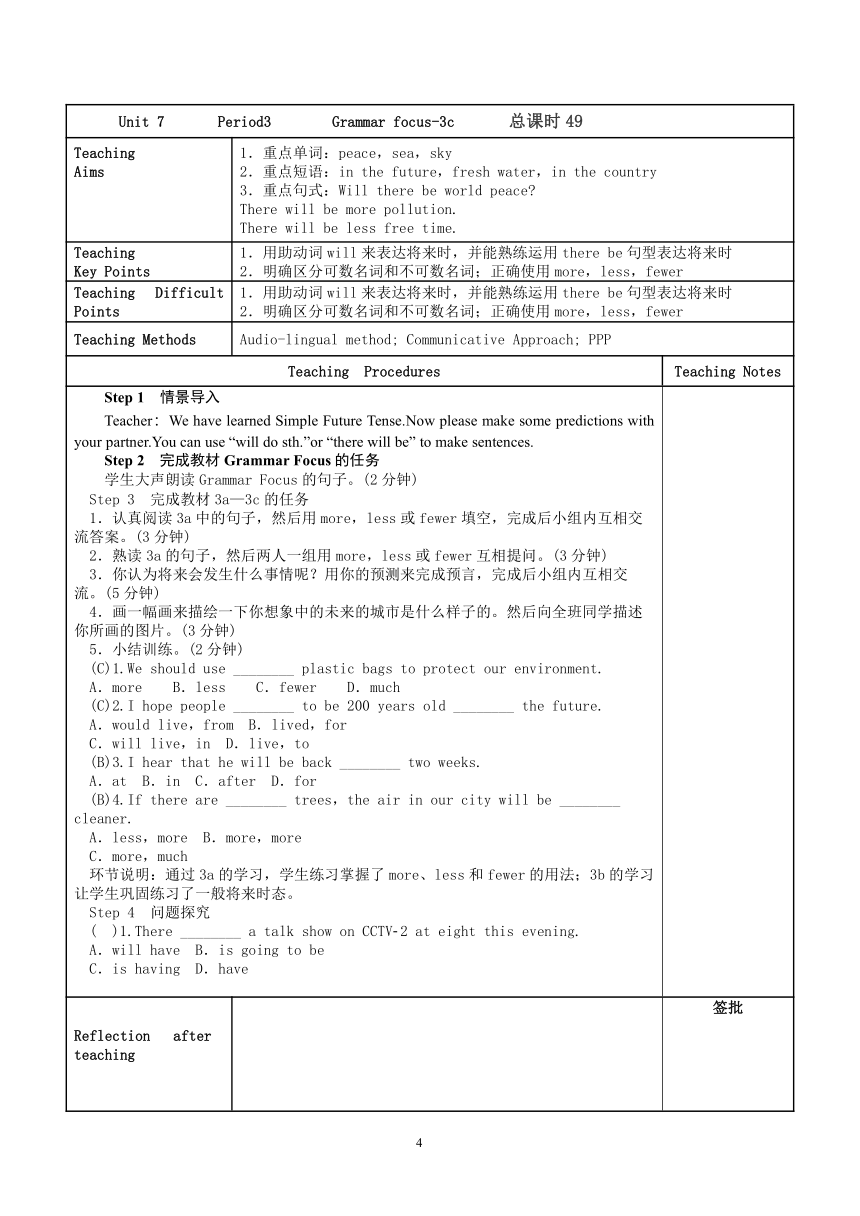Unit 7 Will people have robots? 单元表格式教案(8课时)
文档属性
| 名称 | Unit 7 Will people have robots? 单元表格式教案(8课时) |  | |
| 格式 | zip | ||
| 文件大小 | 95.0KB | ||
| 资源类型 | 教案 | ||
| 版本资源 | 人教新目标(Go for it)版 | ||
| 科目 | 英语 | ||
| 更新时间 | 2021-10-19 13:51:50 | ||
图片预览




文档简介
Unit 7 Will people have robots
单元教材分析 1. 单元背景分析本单元通过运用一般将来时,进行对未来的设想,让学生发挥想象力,畅谈对未来的设想,同时了解当今世界环境污染问题,了解未来机器人的发展趋势。2. 教材内容分析这篇文章主要介绍了机器人目前的现状及未来机器人的发展趋势,向学生介绍了不同种类的机器人,提出机器人是否能够向人类一样思考。结合课文,让学生意识到机器人目前及将来对人类的影响,同时学生能够发挥想象力,大胆想象未来机器人的形状、功能等。
单元教学目标 (1) 语言知识目标能正确使用本课出现的重点短语能正确使用一般将来时谈论对未来的预测(2) 语言技能目标通过本课的学习,能够培养学生良好的阅读能力,使学生能运用所学知识解决相关情景中的一些类似问题,并能结合所给任务,综合运用新旧知识解决问题, (3) 情感目标培养学生学会表达自己喜欢的机器人以及喜欢的理由,就未来机器人的发展提出独特的见解及大胆的预测。
单元训练重难点
重点 难点
重点短语over and over again get bored be able tofor example wake up disagree withhundreds of fall down look for Some scientists believe that although we can make robots move like people, it will be difficult to make them really think like a human.一般将来时描述未来机器人的形状、用途。
单元课时安排 Period 1 section A 1a—1cPeriod 2 section A 2a-2dPeriod 3 section A Grammer Focus-3cPeriod 4 section B 1a-1ePeriod 5-6 section B 2a-2ePeriod 7 section B 3a-3cPeriod 8 section B 4-self check
Unit 7 period1 Section A (1a-1d) 总课时47
TeachingAims 1.重点单词:paper2.重点短语:in their homes,in 100 years,on computer,on paper3.重点句式:—Do you think there will be robots in people's homes —Yes,there will.Kids won't go to school.They will study at home on computers.People will live to be 200 years old.—Will people use money in 100 years —No,they won't.Everything will be free.
Key Points 1.will构成的一般将来时态的肯定句、否定句、一般疑问句及回答2.做预言,用will来讨论未来发生的事情
Difficult Points 做预言,用will来讨论未来发生的事情
Teaching Methods Audio-lingual method; Communicative Approach; PPT
Teaching Procedures Teaching Notes
Step 1 情景导入(Show a picture of a robot)Teacher:What's this Students:It's a robot.Step 2 完成教材1a—1c的任务1.在今后的100年里世界将会有怎样的不同呢?阅读1a中的预言,同意请在A处打勾,不同意请在D处打勾,完成后小组内互相交流。(3分钟)2.熟读1a中的句子,并两人一组互相背诵句子。(5分钟)3.以小组为单位,结合图片和1a中的句子,小组讨论一般将来时态的各种句型的构成,教师点拨。(5分钟)1.will表示将来时的用法1)他们将有个愉快的寒假。They_will_have_a_pleasant_winter_holiday.2)他们将不会有一个愉快的寒假。They_won't_have_a_pleasant_winter_holiday.3)他们将有个愉快的寒假吗?是的,会有。/不,不会的。Will_they_have_a_pleasant_winter_holiday?Yes,they_will./No,they_won't.一般将来时态表达将来某一时间要发生或将要发生的动作或状态。其陈述句构成为:主语+will+动词原形(当主语为第一人称时,一般用shall代替will;当主语为其他人称时,用will,但主语为第一人称时,也可以用will)。否定句:主语+will+not+动词原形.一般疑问句:Will+主语+动词原形?肯定回答:Yes,主+will.否定回答:No,主+will+not(可以缩写成won't).2.in+一段时间的用法1)他三个小时以后回来。He'll_come_back_in_three_hours.“in+一段时间”表示时间段之后,常用于将来时态中。 对此短语提问用How_soon。
Reflection after teaching 签批
Unit 7 Period2 Section A (2a-2d ) 总课时48
TeachingAims 1.重点单词:pollution,prediction,future,pollute,environment,planet,earth,plant,part2.重点句式:People will use the subways less.What's your prediction about the future I think there will be more pollution.I don't think so.I think there will be fewer trees.It's a book about future.
Teaching Key Points 1.用助动词will来表达将来时,并能熟练运用there be 句型表达将来时2.明确区分可数名词和不可数名词;正确使用more,less,fewer
Teaching Difficult Points 1.用助动词will来表达将来时,并能熟练运用there be句型表达将来时2.明确区分可数名词和不可数名词;正确使用more,less,fewer
Teaching Methods Audio-lingual method; Communicative Approach; PPt
Teaching Procedures Teaching Notes
Step 1 情景导入(Show some pictures to the students)Teacher:This is our earth in 100 years.What will the earth be like?Step 2 完成教材2a—2c的任务1.大声朗读2a中的句子,为听力做好准备。(2分钟)2.听录音,圈出括号中你所听到的单词,完成2a。(3分钟)3.朗读2b中的句子,然后再听一遍录音,圈出你所听到的预言,完成2b。(4分钟)Step 3 完成教材2d的任务1.学生自读对话,回答下面的问题:2.大声朗读2d对话,读熟后与同伴分角色表演对话。(3分钟)3.邀请三组学生来表演对话。(5分钟)1.There be句型的一般将来时There be句型的一般将来时的构成:肯定句:There will be+名词+其他成分.2.few,a few,little,a little,much,manyfew和a few修饰或代替可数名词,few表示否定意义,a few表示肯定意义;little和a little修饰或代替不可数名词,little表示否定意义,a little表示肯定意义。可数名词和不可数名词前都可用some,any,a lot of,lots of等修饰。可数名词表示不确定数量时,用a few,few,many修饰,询问数量时用How_many;不可数名词表示不确定数量时,用a little,little,much修饰,询问数量时,用How_much。3.more,less,fewer的用法more是many和much的比较级,其后既可以跟可数名词复数,也可以跟不可数名词,意思是“更多”。less是little的比较级,其后只接不可数名词,意思是“更少的,较少的”。fewer是few的比较级,其后只接可数名词的复数形式,意思是“更少的,较少的”
Reflection after teaching 签批
Unit 7 Period3 Grammar focus-3c 总课时49
TeachingAims 1.重点单词:peace,sea,sky2.重点短语:in the future,fresh water,in the country3.重点句式:Will there be world peace There will be more pollution.There will be less free time.
Teaching Key Points 1.用助动词will来表达将来时,并能熟练运用there be句型表达将来时2.明确区分可数名词和不可数名词;正确使用more,less,fewer
Teaching Difficult Points 1.用助动词will来表达将来时,并能熟练运用there be句型表达将来时2.明确区分可数名词和不可数名词;正确使用more,less,fewer
Teaching Methods Audio-lingual method; Communicative Approach; PPP
Teaching Procedures Teaching Notes
Step 1 情景导入Teacher:We have learned Simple Future Tense.Now please make some predictions with your partner.You can use “will do sth.”or “there will be” to make sentences.Step 2 完成教材Grammar Focus的任务学生大声朗读Grammar Focus的句子。(2分钟)Step 3 完成教材3a—3c的任务1.认真阅读3a中的句子,然后用more,less或fewer填空,完成后小组内互相交流答案。(3分钟)2.熟读3a的句子,然后两人一组用more,less或fewer互相提问。(3分钟)3.你认为将来会发生什么事情呢?用你的预测来完成预言,完成后小组内互相交流。(5分钟)4.画一幅画来描绘一下你想象中的未来的城市是什么样子的。然后向全班同学描述你所画的图片。(3分钟)5.小结训练。(2分钟)(C)1.We should use ________ plastic bags to protect our environment.A.more B.less C.fewer D.much(C)2.I hope people ________ to be 200 years old ________ the future.A.would live,from B.lived,forC.will live,in D.live,to(B)3.I hear that he will be back ________ two weeks.A.at B.in C.after D.for(B)4.If there are ________ trees,the air in our city will be ________ cleaner.A.less,more B.more,moreC.more,much环节说明:通过3a的学习,学生练习掌握了more、less和fewer的用法;3b的学习让学生巩固练习了一般将来时态。Step 4 问题探究( )1.There ________ a talk show on CCTV 2 at eight this evening.A.will have B.is going to beC.is having D.have
Reflection after teaching 签批
Unit 7 Period 4 Section B( 1a-1d) 总课时50
TeachingAims 1.重点单词:astronaut,apartment,rocket,space2.重点短语:space station3.重点句式:—Where do you live —I live in an apartment.I will fly rockets to the moon.
Key Points 1.掌握关于职业、交通的单词2.巩固一般过去时态、一般现在时态和一般将来时态的用法区别
Difficult Points 巩固一般过去时态、一般现在时态和一般将来时态的用法区别
Teaching Methods Audio-lingual method; Communicative Approach; PPP
Teaching Procedures Teaching Notes
Step 1 情景导入Teacher:We have learned many words about jobs,transportation and places to live.Can you say some words (Let some students say some words that we have learned about jobs,transportation and places to live.)Today we will go on learning some new words about them.Now let's learn new words about them.Step 2 完成教材1a—1b的任务1.学生领读1a单词或词组,两人一组互相提问单词。(3分钟)2.将1a方框中的单词或词组分类,完成后集体核对答案。(2分钟)3.在1a中的各个方框中填写更多的同类单词,完成后小组内互相交流答案,并大声地朗读这些单词。(5分钟)4.小结训练。(3分钟)1)My family live in a big apartment in a big city.2)I want to go to a space station.3)My uncle is a computer programmer.4)Yang Liwei is an astronaut.5)People will fly rockets to the moon one day.环节说明:通过本环节的学习,学生掌握了表示职业、交通和居住地方的单词。Step 3 完成教材1c—1e的任务1.听Alexis和Joe的对话,按听到的顺序给图片标号,集体核对答案,完成1c。(3分钟)2.再听一遍录音,用正确的单词来补全句子。(3分钟)3.再细心听录音,并跟读以整体感知对话。(3分钟)4.一个学生扮演Alexis,另外一个学生扮演Joe,来谈论Joe现在、十年前和十年后的生活,邀请几组学生来展示对话。(5分钟)Step 4 问题探究My uncle often flies to London. (改为同义句)________________________________________________________________________根据句意“我叔叔经常乘飞机去伦敦”可知,fly to...飞往……=go...by air/plane。因而答案为:My uncle often goes to London by air/plane.
Reflection after teaching 签批
Unit 7 Period 5-6 Section B 2a-2d 总课时51.52
TeachingAims 1.重点单词:even,human,servant,dangerous,already,factory,simple,believe,able,disagree,shape,fall,possible,impossible,side2.重点短语:over and over again,get bored,hundreds of,fall down,look for,at some point3.重点句式:They are usually like human servants.They help with the housework and do jobs like working in dirty or dangerous places.There are already robots working in factories.Some scientists believe that there will be more robots in the future.Scientists are now trying to make robots look like humans and do the same things as we do.For example,scientist James White thinks that robots will never be able to wake up and know where they are.
Key Points 1.重点短语和句型2.会用will来谈论将要发生的事情
Difficult Points 重点短语和句型
Teaching Methods 分组合作,小组练习,集体讨论
Teaching Procedures Teaching Notes
Step 1 情景导入(Show some pictures of robots to the students)Teacher:Do you know what they are?Yes,they are robots.In some science fiction movies,we often see many robots.Can you tell us what they look like and what they can do?Can you also tell us something else about the robots 环节说明:由机器人的图片入手,向学生提出问题,引起学生的好奇心,激发他们求知的欲望,为本课的学习做好铺垫。Step 2 完成教材2a—2c的任务1.小组内互相交流各自知道的机器人,他们看起来像什么,他们能做什么。(3分钟)2.快速阅读2b短文,了解短文大意,完成2b中的填空,集体核对答案。(3分钟)3.认真阅读短文,写出3项未来机器人能够完成的工作,完成后小组内交流答案。 (5分钟)4.再次细心阅读短文,理解每一句话的意思,小组合作解决遇到的疑难问题。(5分钟)5.教师点拨短文中出现的重点和难点。(5分钟)6.熟读短文,识记背诵知识要点。(5分钟)7.小结训练。(7分钟)(B)1.There are many people ________ in the park.A.walk B.walkingC.to walk D.walked(C)2.The old man is very kind,he always helps with ________ the children.A.look after B.looking forC.looking after D.looks after(B)3.I ________ believe he ________ come back in two days.A./,won't B.don't,willC.don't,won't D.isn't,will(B)4.I think it is possible ________ the students ________ English well.A.of,learning B.for,to learnC.of,to learn D.for,learning(C)5.It's eight o'clock.Please ________.A.wake up he B.wake up himC.wake him up D.wake his up(C)6.I lost my bike yesterday.I ________ it now.But I can't ________ it.A.look for,find B.finding,look forC.am looking for,find D.looking for,finding(C)7.There are ________ people in the cinema watching the new movie.A.two hundred of B.two hundredsC.hundreds of D.two hundreds of(C)8.The house might ________ in a few months.A.fall behind B.fall offC.fall down D.fall for环节说明:本环节的学习不仅锻炼了学生的阅读能力,而且小结训练让学生对重要知识点进行了巩固练习。Step 3 完成教材2d—2e的任务1.认真阅读短文,根据短文内容回答,完成2d短文填空,集体核对答案,并大声朗读短文。(5分钟)2.认真观察2e中的机器人,想象一下他们能够帮助你或你的家庭做什么工作。把你的想法写出来,然后小组内交流讨论。(5分钟)环节说明:2d 环节的学习让学生对文章有了更深刻的理解;2e环节让学生灵活运用了一般将来时态,并锻炼了学生的想象力和书面表达能力。Step 4 问题探究1.wake up的用法1)他每天早上6点钟醒来。He_wakes_up_at_6:00_every_morning.2)他妈妈每天早晨6点钟把他叫醒。His_mother_wakes_him_up_at_6:00_every_morning.wake up意为“醒来,叫醒”,是动词+副词结构。如果宾语是人称代词的宾格要放到中间;如果宾语是名词既可以放到中间也可以放到末尾。( )2.—How many birds can you see in the trees —I can see ________ birds in them.A.hundreds of B.five hundredsC.hundred of D.five hundreds of答案选择A,hundred“百”,当前面有具体数字的时候,其后不加s,不和of 连用。若表示一个不确定的数目时,前面没有具体的数字时,其后要加s,而且与of 连用。故正确答案为A选项。( )3.There are some boys ________ in the swimming pool.A.swim B.to swimC.swiming D.swimming答案选择D,本句含有固定句型:There is/are+sb./sth.+doing sth.,表示“有某人/某物在做某事”。
Reflection after teaching 签批
Unit 7 Period 7 Section B 3a-3c 总课时53
TeachingAims 1.重点单词:probably,during,holiday2.重点短语:as a reporter,during the week,the meaning of the word,both...and...3.重点句式:In 20 years,I think I'll be a newspaper reporter
Teaching Key Points 1.重点单词和句型2.能用will句型描述将来的生活
Difficult Points 能用will句型描述将来的生活
Teaching Methods Audio-lingual method; Communicative Approach; PPP
Teaching Procedures Teaching Notes
Step 1 情景导入Teacher:The world is changing faster and faster,the life in 20 years is different from the life now.What do you think your life will be like in the future?Can you imagine the life in 20 years?Now please say something about life in the future to your partner.Step 2 完成教材3a—4的任务1.认真阅读3a中关于Jill的未来是什么样子的短文,选用方框中的单词来补全短文,完成后集体核对答案,然后大声地朗读短文。(5分钟)2.想象一下你自己20年后的生活是什么样子的,根据3b的要求项目来完成表格,你可以添加更多的内容,完成后小组内互相交流,完成3b。(3分钟)3.根据3b填写的内容仿照3a的形式来写一写20年后的生活,完成后小组内互相交流纠错,借鉴好词好句,教师批阅点拨。(7分钟)参考案例In 20 years,I think I will be a doctor.I'll live in Beijing.Because it is the capital of China and it is a beautiful city.As a doctor,I think I will be busy to save people's lives.In the future,people will have more time to enjoy the life.So will I.I will exercise every day.I will run in the morning,and have a walk with my family after supper.I will listen to music to make me relaxed.I will play basketball with my friends on weekends.It will make me fit and happy.I will go to many countries to take vacations.In 20 years,our neighborhood will be more beautiful,there will be more parks.In the parks there will be more trees and grass.We can relax in the parks.We will also do less housework.Because we will have robots in our homes,the robots can help us do all the housework.The life in 20 years will be very good.4.以小组为单位讨论未来机器人在学业方面怎样帮助学生,把你们小组的见解写下来,然后画一幅机器人的图片。(5分钟)Step 3 完成教材Self Check的任务1.朗读1表格中的单词,然后将这些单词按要求分类。(3分钟)2.认真阅读2中的对话,根据所学知识将对话补充完整,集体核对答案,两人结对练习对话。(5分钟)Step 4 问题探究( )1.________ Jim ________ Tara like playing chess.A.Neither,nor B.Either,or C.Both,and
Reflection after teaching 签批
Unit 7 Period 8 Section B 4-selfcheck 总课时54
TeachingAims 1.Knowledge Objects1) 复习be going to 用法。 2) 复习并熟练运用本单元的重点单词和语法 3)通过完成Self check的中练习题来全面复习be going to。2.Ability Objects: Sovle all the Exercise. 3. Moral ObjectsTo be more interested in English through finishing the Exercise
Key Points Vocabulary and phrases in this unit
Difficult Points 1.Review the words in Unit6 2.Learn to write
Teaching Methods Task-based teaching method, discussion, writing
Teaching Procedures Teaching Notes
1.在电脑上 on computers 2.在纸上 on paper3.活到200岁 live to be 200 years old 4.在100年后 in 100 years5.空闲时间 free time 6.处于极大的危险中 be in great danger7.在地球上 on the earth 8.参与做某事 play a part in doing sth9.在将来 in the future 10. 太空站 space station11.帮忙做家务 help with housework12. 多次地,反复地 over and over again13.这样的工作 such jobs 14. 感到厌烦 get bored15.看起来像 look like 16. 能,会 be able to17.醒来,唤醒 wake up 18. 不同意某意见 disagree with19.数以百计的 hundreds of 20.突然倒下,倒塌 fall down21.寻找 look for 22.作为一名记者 as a reporter23.度假,休假 take a holiday 24.有一天 one day25.更少的空闲时间 less free time 26.更多的污染 more pollution1.will+动词原形 将要做……2.fewer/more+可数名词复数 更少/更多……less/more+不可数名词 更少/更多……3.have to do sth.不得不做某事(客观) must 必须(主观)4.agree with sb. 同意某人的意见5.There will be + 主语+其他 将会有…… =There be going to be…6.There is/are +sb./sth.+doing sth. 有……正在做某事7.make sb. do sth. 使某人做某事8.help sb. with sth. 帮助某人做某事 9.What will the future be like 未来将会是什么样子?10.Which side do you agree with 你同意哪一方的观点?
Reflection after teaching 签批
9
单元教材分析 1. 单元背景分析本单元通过运用一般将来时,进行对未来的设想,让学生发挥想象力,畅谈对未来的设想,同时了解当今世界环境污染问题,了解未来机器人的发展趋势。2. 教材内容分析这篇文章主要介绍了机器人目前的现状及未来机器人的发展趋势,向学生介绍了不同种类的机器人,提出机器人是否能够向人类一样思考。结合课文,让学生意识到机器人目前及将来对人类的影响,同时学生能够发挥想象力,大胆想象未来机器人的形状、功能等。
单元教学目标 (1) 语言知识目标能正确使用本课出现的重点短语能正确使用一般将来时谈论对未来的预测(2) 语言技能目标通过本课的学习,能够培养学生良好的阅读能力,使学生能运用所学知识解决相关情景中的一些类似问题,并能结合所给任务,综合运用新旧知识解决问题, (3) 情感目标培养学生学会表达自己喜欢的机器人以及喜欢的理由,就未来机器人的发展提出独特的见解及大胆的预测。
单元训练重难点
重点 难点
重点短语over and over again get bored be able tofor example wake up disagree withhundreds of fall down look for Some scientists believe that although we can make robots move like people, it will be difficult to make them really think like a human.一般将来时描述未来机器人的形状、用途。
单元课时安排 Period 1 section A 1a—1cPeriod 2 section A 2a-2dPeriod 3 section A Grammer Focus-3cPeriod 4 section B 1a-1ePeriod 5-6 section B 2a-2ePeriod 7 section B 3a-3cPeriod 8 section B 4-self check
Unit 7 period1 Section A (1a-1d) 总课时47
TeachingAims 1.重点单词:paper2.重点短语:in their homes,in 100 years,on computer,on paper3.重点句式:—Do you think there will be robots in people's homes —Yes,there will.Kids won't go to school.They will study at home on computers.People will live to be 200 years old.—Will people use money in 100 years —No,they won't.Everything will be free.
Key Points 1.will构成的一般将来时态的肯定句、否定句、一般疑问句及回答2.做预言,用will来讨论未来发生的事情
Difficult Points 做预言,用will来讨论未来发生的事情
Teaching Methods Audio-lingual method; Communicative Approach; PPT
Teaching Procedures Teaching Notes
Step 1 情景导入(Show a picture of a robot)Teacher:What's this Students:It's a robot.Step 2 完成教材1a—1c的任务1.在今后的100年里世界将会有怎样的不同呢?阅读1a中的预言,同意请在A处打勾,不同意请在D处打勾,完成后小组内互相交流。(3分钟)2.熟读1a中的句子,并两人一组互相背诵句子。(5分钟)3.以小组为单位,结合图片和1a中的句子,小组讨论一般将来时态的各种句型的构成,教师点拨。(5分钟)1.will表示将来时的用法1)他们将有个愉快的寒假。They_will_have_a_pleasant_winter_holiday.2)他们将不会有一个愉快的寒假。They_won't_have_a_pleasant_winter_holiday.3)他们将有个愉快的寒假吗?是的,会有。/不,不会的。Will_they_have_a_pleasant_winter_holiday?Yes,they_will./No,they_won't.一般将来时态表达将来某一时间要发生或将要发生的动作或状态。其陈述句构成为:主语+will+动词原形(当主语为第一人称时,一般用shall代替will;当主语为其他人称时,用will,但主语为第一人称时,也可以用will)。否定句:主语+will+not+动词原形.一般疑问句:Will+主语+动词原形?肯定回答:Yes,主+will.否定回答:No,主+will+not(可以缩写成won't).2.in+一段时间的用法1)他三个小时以后回来。He'll_come_back_in_three_hours.“in+一段时间”表示时间段之后,常用于将来时态中。 对此短语提问用How_soon。
Reflection after teaching 签批
Unit 7 Period2 Section A (2a-2d ) 总课时48
TeachingAims 1.重点单词:pollution,prediction,future,pollute,environment,planet,earth,plant,part2.重点句式:People will use the subways less.What's your prediction about the future I think there will be more pollution.I don't think so.I think there will be fewer trees.It's a book about future.
Teaching Key Points 1.用助动词will来表达将来时,并能熟练运用there be 句型表达将来时2.明确区分可数名词和不可数名词;正确使用more,less,fewer
Teaching Difficult Points 1.用助动词will来表达将来时,并能熟练运用there be句型表达将来时2.明确区分可数名词和不可数名词;正确使用more,less,fewer
Teaching Methods Audio-lingual method; Communicative Approach; PPt
Teaching Procedures Teaching Notes
Step 1 情景导入(Show some pictures to the students)Teacher:This is our earth in 100 years.What will the earth be like?Step 2 完成教材2a—2c的任务1.大声朗读2a中的句子,为听力做好准备。(2分钟)2.听录音,圈出括号中你所听到的单词,完成2a。(3分钟)3.朗读2b中的句子,然后再听一遍录音,圈出你所听到的预言,完成2b。(4分钟)Step 3 完成教材2d的任务1.学生自读对话,回答下面的问题:2.大声朗读2d对话,读熟后与同伴分角色表演对话。(3分钟)3.邀请三组学生来表演对话。(5分钟)1.There be句型的一般将来时There be句型的一般将来时的构成:肯定句:There will be+名词+其他成分.2.few,a few,little,a little,much,manyfew和a few修饰或代替可数名词,few表示否定意义,a few表示肯定意义;little和a little修饰或代替不可数名词,little表示否定意义,a little表示肯定意义。可数名词和不可数名词前都可用some,any,a lot of,lots of等修饰。可数名词表示不确定数量时,用a few,few,many修饰,询问数量时用How_many;不可数名词表示不确定数量时,用a little,little,much修饰,询问数量时,用How_much。3.more,less,fewer的用法more是many和much的比较级,其后既可以跟可数名词复数,也可以跟不可数名词,意思是“更多”。less是little的比较级,其后只接不可数名词,意思是“更少的,较少的”。fewer是few的比较级,其后只接可数名词的复数形式,意思是“更少的,较少的”
Reflection after teaching 签批
Unit 7 Period3 Grammar focus-3c 总课时49
TeachingAims 1.重点单词:peace,sea,sky2.重点短语:in the future,fresh water,in the country3.重点句式:Will there be world peace There will be more pollution.There will be less free time.
Teaching Key Points 1.用助动词will来表达将来时,并能熟练运用there be句型表达将来时2.明确区分可数名词和不可数名词;正确使用more,less,fewer
Teaching Difficult Points 1.用助动词will来表达将来时,并能熟练运用there be句型表达将来时2.明确区分可数名词和不可数名词;正确使用more,less,fewer
Teaching Methods Audio-lingual method; Communicative Approach; PPP
Teaching Procedures Teaching Notes
Step 1 情景导入Teacher:We have learned Simple Future Tense.Now please make some predictions with your partner.You can use “will do sth.”or “there will be” to make sentences.Step 2 完成教材Grammar Focus的任务学生大声朗读Grammar Focus的句子。(2分钟)Step 3 完成教材3a—3c的任务1.认真阅读3a中的句子,然后用more,less或fewer填空,完成后小组内互相交流答案。(3分钟)2.熟读3a的句子,然后两人一组用more,less或fewer互相提问。(3分钟)3.你认为将来会发生什么事情呢?用你的预测来完成预言,完成后小组内互相交流。(5分钟)4.画一幅画来描绘一下你想象中的未来的城市是什么样子的。然后向全班同学描述你所画的图片。(3分钟)5.小结训练。(2分钟)(C)1.We should use ________ plastic bags to protect our environment.A.more B.less C.fewer D.much(C)2.I hope people ________ to be 200 years old ________ the future.A.would live,from B.lived,forC.will live,in D.live,to(B)3.I hear that he will be back ________ two weeks.A.at B.in C.after D.for(B)4.If there are ________ trees,the air in our city will be ________ cleaner.A.less,more B.more,moreC.more,much环节说明:通过3a的学习,学生练习掌握了more、less和fewer的用法;3b的学习让学生巩固练习了一般将来时态。Step 4 问题探究( )1.There ________ a talk show on CCTV 2 at eight this evening.A.will have B.is going to beC.is having D.have
Reflection after teaching 签批
Unit 7 Period 4 Section B( 1a-1d) 总课时50
TeachingAims 1.重点单词:astronaut,apartment,rocket,space2.重点短语:space station3.重点句式:—Where do you live —I live in an apartment.I will fly rockets to the moon.
Key Points 1.掌握关于职业、交通的单词2.巩固一般过去时态、一般现在时态和一般将来时态的用法区别
Difficult Points 巩固一般过去时态、一般现在时态和一般将来时态的用法区别
Teaching Methods Audio-lingual method; Communicative Approach; PPP
Teaching Procedures Teaching Notes
Step 1 情景导入Teacher:We have learned many words about jobs,transportation and places to live.Can you say some words (Let some students say some words that we have learned about jobs,transportation and places to live.)Today we will go on learning some new words about them.Now let's learn new words about them.Step 2 完成教材1a—1b的任务1.学生领读1a单词或词组,两人一组互相提问单词。(3分钟)2.将1a方框中的单词或词组分类,完成后集体核对答案。(2分钟)3.在1a中的各个方框中填写更多的同类单词,完成后小组内互相交流答案,并大声地朗读这些单词。(5分钟)4.小结训练。(3分钟)1)My family live in a big apartment in a big city.2)I want to go to a space station.3)My uncle is a computer programmer.4)Yang Liwei is an astronaut.5)People will fly rockets to the moon one day.环节说明:通过本环节的学习,学生掌握了表示职业、交通和居住地方的单词。Step 3 完成教材1c—1e的任务1.听Alexis和Joe的对话,按听到的顺序给图片标号,集体核对答案,完成1c。(3分钟)2.再听一遍录音,用正确的单词来补全句子。(3分钟)3.再细心听录音,并跟读以整体感知对话。(3分钟)4.一个学生扮演Alexis,另外一个学生扮演Joe,来谈论Joe现在、十年前和十年后的生活,邀请几组学生来展示对话。(5分钟)Step 4 问题探究My uncle often flies to London. (改为同义句)________________________________________________________________________根据句意“我叔叔经常乘飞机去伦敦”可知,fly to...飞往……=go...by air/plane。因而答案为:My uncle often goes to London by air/plane.
Reflection after teaching 签批
Unit 7 Period 5-6 Section B 2a-2d 总课时51.52
TeachingAims 1.重点单词:even,human,servant,dangerous,already,factory,simple,believe,able,disagree,shape,fall,possible,impossible,side2.重点短语:over and over again,get bored,hundreds of,fall down,look for,at some point3.重点句式:They are usually like human servants.They help with the housework and do jobs like working in dirty or dangerous places.There are already robots working in factories.Some scientists believe that there will be more robots in the future.Scientists are now trying to make robots look like humans and do the same things as we do.For example,scientist James White thinks that robots will never be able to wake up and know where they are.
Key Points 1.重点短语和句型2.会用will来谈论将要发生的事情
Difficult Points 重点短语和句型
Teaching Methods 分组合作,小组练习,集体讨论
Teaching Procedures Teaching Notes
Step 1 情景导入(Show some pictures of robots to the students)Teacher:Do you know what they are?Yes,they are robots.In some science fiction movies,we often see many robots.Can you tell us what they look like and what they can do?Can you also tell us something else about the robots 环节说明:由机器人的图片入手,向学生提出问题,引起学生的好奇心,激发他们求知的欲望,为本课的学习做好铺垫。Step 2 完成教材2a—2c的任务1.小组内互相交流各自知道的机器人,他们看起来像什么,他们能做什么。(3分钟)2.快速阅读2b短文,了解短文大意,完成2b中的填空,集体核对答案。(3分钟)3.认真阅读短文,写出3项未来机器人能够完成的工作,完成后小组内交流答案。 (5分钟)4.再次细心阅读短文,理解每一句话的意思,小组合作解决遇到的疑难问题。(5分钟)5.教师点拨短文中出现的重点和难点。(5分钟)6.熟读短文,识记背诵知识要点。(5分钟)7.小结训练。(7分钟)(B)1.There are many people ________ in the park.A.walk B.walkingC.to walk D.walked(C)2.The old man is very kind,he always helps with ________ the children.A.look after B.looking forC.looking after D.looks after(B)3.I ________ believe he ________ come back in two days.A./,won't B.don't,willC.don't,won't D.isn't,will(B)4.I think it is possible ________ the students ________ English well.A.of,learning B.for,to learnC.of,to learn D.for,learning(C)5.It's eight o'clock.Please ________.A.wake up he B.wake up himC.wake him up D.wake his up(C)6.I lost my bike yesterday.I ________ it now.But I can't ________ it.A.look for,find B.finding,look forC.am looking for,find D.looking for,finding(C)7.There are ________ people in the cinema watching the new movie.A.two hundred of B.two hundredsC.hundreds of D.two hundreds of(C)8.The house might ________ in a few months.A.fall behind B.fall offC.fall down D.fall for环节说明:本环节的学习不仅锻炼了学生的阅读能力,而且小结训练让学生对重要知识点进行了巩固练习。Step 3 完成教材2d—2e的任务1.认真阅读短文,根据短文内容回答,完成2d短文填空,集体核对答案,并大声朗读短文。(5分钟)2.认真观察2e中的机器人,想象一下他们能够帮助你或你的家庭做什么工作。把你的想法写出来,然后小组内交流讨论。(5分钟)环节说明:2d 环节的学习让学生对文章有了更深刻的理解;2e环节让学生灵活运用了一般将来时态,并锻炼了学生的想象力和书面表达能力。Step 4 问题探究1.wake up的用法1)他每天早上6点钟醒来。He_wakes_up_at_6:00_every_morning.2)他妈妈每天早晨6点钟把他叫醒。His_mother_wakes_him_up_at_6:00_every_morning.wake up意为“醒来,叫醒”,是动词+副词结构。如果宾语是人称代词的宾格要放到中间;如果宾语是名词既可以放到中间也可以放到末尾。( )2.—How many birds can you see in the trees —I can see ________ birds in them.A.hundreds of B.five hundredsC.hundred of D.five hundreds of答案选择A,hundred“百”,当前面有具体数字的时候,其后不加s,不和of 连用。若表示一个不确定的数目时,前面没有具体的数字时,其后要加s,而且与of 连用。故正确答案为A选项。( )3.There are some boys ________ in the swimming pool.A.swim B.to swimC.swiming D.swimming答案选择D,本句含有固定句型:There is/are+sb./sth.+doing sth.,表示“有某人/某物在做某事”。
Reflection after teaching 签批
Unit 7 Period 7 Section B 3a-3c 总课时53
TeachingAims 1.重点单词:probably,during,holiday2.重点短语:as a reporter,during the week,the meaning of the word,both...and...3.重点句式:In 20 years,I think I'll be a newspaper reporter
Teaching Key Points 1.重点单词和句型2.能用will句型描述将来的生活
Difficult Points 能用will句型描述将来的生活
Teaching Methods Audio-lingual method; Communicative Approach; PPP
Teaching Procedures Teaching Notes
Step 1 情景导入Teacher:The world is changing faster and faster,the life in 20 years is different from the life now.What do you think your life will be like in the future?Can you imagine the life in 20 years?Now please say something about life in the future to your partner.Step 2 完成教材3a—4的任务1.认真阅读3a中关于Jill的未来是什么样子的短文,选用方框中的单词来补全短文,完成后集体核对答案,然后大声地朗读短文。(5分钟)2.想象一下你自己20年后的生活是什么样子的,根据3b的要求项目来完成表格,你可以添加更多的内容,完成后小组内互相交流,完成3b。(3分钟)3.根据3b填写的内容仿照3a的形式来写一写20年后的生活,完成后小组内互相交流纠错,借鉴好词好句,教师批阅点拨。(7分钟)参考案例In 20 years,I think I will be a doctor.I'll live in Beijing.Because it is the capital of China and it is a beautiful city.As a doctor,I think I will be busy to save people's lives.In the future,people will have more time to enjoy the life.So will I.I will exercise every day.I will run in the morning,and have a walk with my family after supper.I will listen to music to make me relaxed.I will play basketball with my friends on weekends.It will make me fit and happy.I will go to many countries to take vacations.In 20 years,our neighborhood will be more beautiful,there will be more parks.In the parks there will be more trees and grass.We can relax in the parks.We will also do less housework.Because we will have robots in our homes,the robots can help us do all the housework.The life in 20 years will be very good.4.以小组为单位讨论未来机器人在学业方面怎样帮助学生,把你们小组的见解写下来,然后画一幅机器人的图片。(5分钟)Step 3 完成教材Self Check的任务1.朗读1表格中的单词,然后将这些单词按要求分类。(3分钟)2.认真阅读2中的对话,根据所学知识将对话补充完整,集体核对答案,两人结对练习对话。(5分钟)Step 4 问题探究( )1.________ Jim ________ Tara like playing chess.A.Neither,nor B.Either,or C.Both,and
Reflection after teaching 签批
Unit 7 Period 8 Section B 4-selfcheck 总课时54
TeachingAims 1.Knowledge Objects1) 复习be going to 用法。 2) 复习并熟练运用本单元的重点单词和语法 3)通过完成Self check的中练习题来全面复习be going to。2.Ability Objects: Sovle all the Exercise. 3. Moral ObjectsTo be more interested in English through finishing the Exercise
Key Points Vocabulary and phrases in this unit
Difficult Points 1.Review the words in Unit6 2.Learn to write
Teaching Methods Task-based teaching method, discussion, writing
Teaching Procedures Teaching Notes
1.在电脑上 on computers 2.在纸上 on paper3.活到200岁 live to be 200 years old 4.在100年后 in 100 years5.空闲时间 free time 6.处于极大的危险中 be in great danger7.在地球上 on the earth 8.参与做某事 play a part in doing sth9.在将来 in the future 10. 太空站 space station11.帮忙做家务 help with housework12. 多次地,反复地 over and over again13.这样的工作 such jobs 14. 感到厌烦 get bored15.看起来像 look like 16. 能,会 be able to17.醒来,唤醒 wake up 18. 不同意某意见 disagree with19.数以百计的 hundreds of 20.突然倒下,倒塌 fall down21.寻找 look for 22.作为一名记者 as a reporter23.度假,休假 take a holiday 24.有一天 one day25.更少的空闲时间 less free time 26.更多的污染 more pollution1.will+动词原形 将要做……2.fewer/more+可数名词复数 更少/更多……less/more+不可数名词 更少/更多……3.have to do sth.不得不做某事(客观) must 必须(主观)4.agree with sb. 同意某人的意见5.There will be + 主语+其他 将会有…… =There be going to be…6.There is/are +sb./sth.+doing sth. 有……正在做某事7.make sb. do sth. 使某人做某事8.help sb. with sth. 帮助某人做某事 9.What will the future be like 未来将会是什么样子?10.Which side do you agree with 你同意哪一方的观点?
Reflection after teaching 签批
9
同课章节目录
- Unit 1 Where did you go on vacation?
- Section A
- Section B
- Unit 2 How often do you exercise?
- Section A
- Section B
- Unit 3 I'm more outgoing than my sister.
- Section A
- Section B
- Unit 4 What's the best movie theater?
- Section A
- Section B
- Unit 5 Do you want to watch a game show?
- Section A
- Section B
- Unit 6 I'm going to study computer science.
- Section A
- Section B
- Unit 7 Will people have robots?
- Section A
- Section B
- Unit 8 How do you make a banana milk shake?
- Section A
- Section B
- Unit 9 Can you come to my party?
- Section A
- Section B
- Unit 10 If you go to the party, you'll have a grea
- Section A
- Section B
